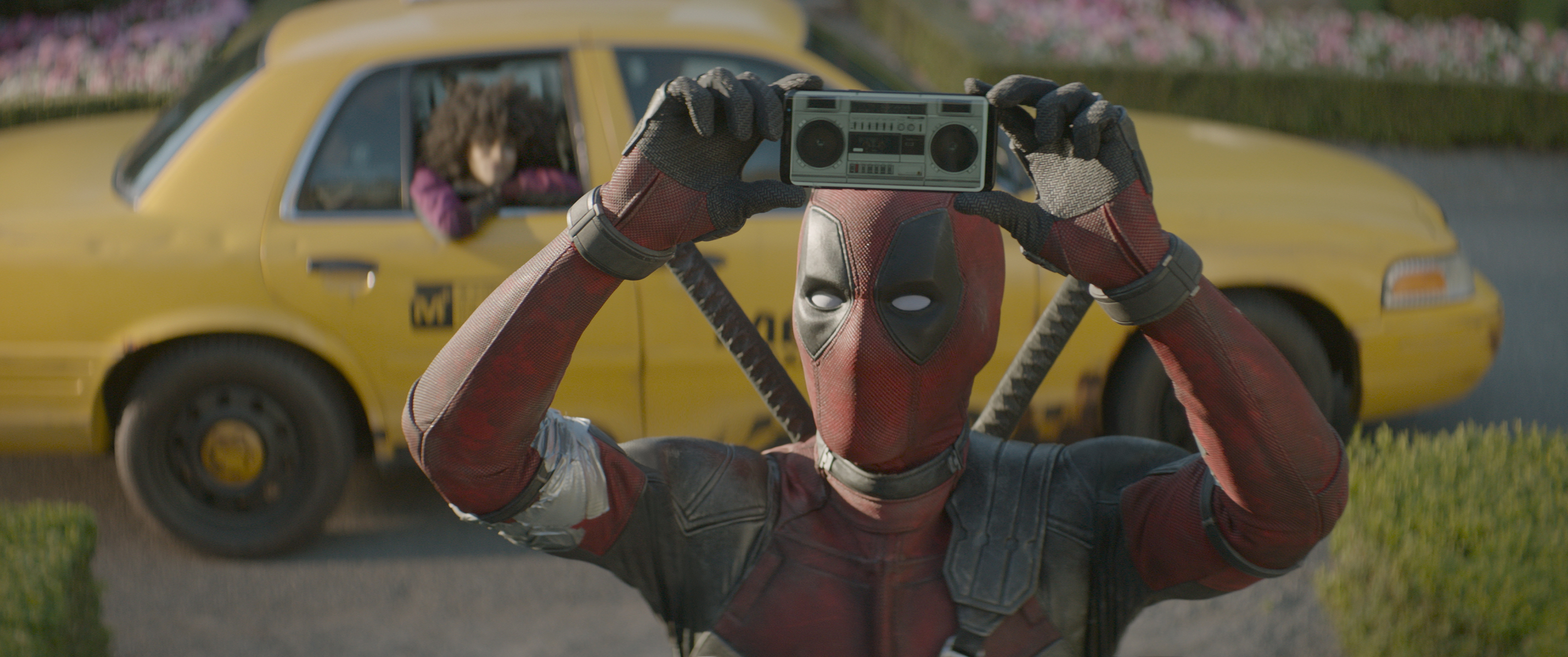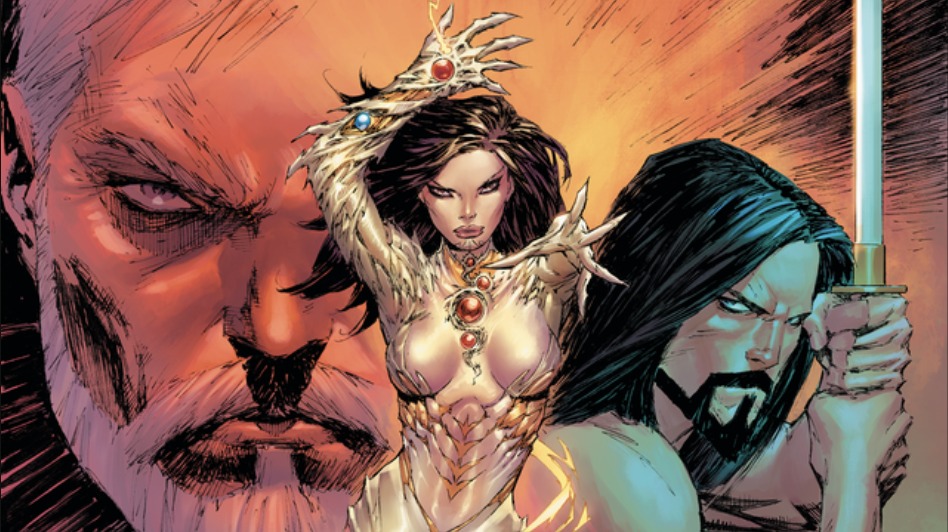

Comics
[Review] ‘Deadpool 2’: Jokes Don’t Save the Superhero Genre Like They Used to…
By 2016, when the first film was released, superheroes were already funny, but Deadpool 2 imagines an alternate timeline where the genre is still in desperate need of levity. Unfortunately, that humor comes in the form of profane, self-referential epithets typically traded between 15-year-olds while playing video games online, which means if you’ve actually used bad language in a public setting or are older than 15, the mileage may vary on Wade Wilson’s particular brand of irreverence. Featuring a plot that unfolds half like a riff on Terminator 2 and half on the kind of after-school special Wilson would mercilessly lampoon, Deadpool 2 utilizes the character’s popularity as a MacGuffin for more rapid-fire jokes, but errs too far on the side of that clownishness to stick the landing once director David Leitch pivots to a payoff that’s (slightly) more serious.
Ryan Reynolds returns as Wilson, the wise-cracking assassin who two years later is contemplating kids with longtime girlfriend Vanessa (Morena Baccarin) and dispatching bad guys a dozen or two at a time. After a brutal attack leaves him despondent and suicidal, he unexpectedly lands in the lap of Colossus (Stefan Kapicic) and Negasonic Teenage Warhead (Brianna Hildebrand), who attempt to enlist him as an X-Man (“trainee”) in the hopes that he’ll bounce back. Their efforts meet with predictably disastrous results: answering a call for help when a teenager named Russell (Julian Dennison, Hunt For the Wilderpeople) starts setting his orphanage on fire, Deadpool gets himself and the kid thrown in a maximum security prison where their powers, including Wilson’s healing factor, will not work. Wilson is content to finally let himself die, but ends up in even bigger trouble when Cable (Josh Brolin), a soldier from the future, shows up with intentions to kill Russell, and he finds himself tasked with rescuing the kid.
As suggested above, exactly how much you’ll enjoy Deadpool 2 has a lot to do with how much you dug its predecessor, an okay movie that shattered the fourth wall and rifled through pop culture references in a way that, irrespective of its otherwise puerile humor, undercut a moment in the life cycle of superhero movies with gleeful specificity. That, of course, was the character’s purpose on the page as well, but there’s something about film that turns effigies into institutions, and Deadpool is now part of the pop culture firmament he was originally designed to tear down. In which case, his barrage of f-bombs and references to mothers named Martha feel a little too familiar, and just far enough behind the curve of what is being discussed in the cultural conversation that they don’t land with the same merciless cruelty that made the previous film, well, if not better, then somehow more incisive.
Instead of an anti-hero razing the genre to the ground from the inside, Wilson seems like a guy particularly well-versed in what’s trending on Twitter who’s cultivated a series of five-minutes-ago references for deployment while basically doing an R-rated version of what every other hero does. Calling Brolin “Thanos” is a funny little barb, but when Domino asks if it’s derivative for Wilson to call his super-group X-Force, it’s hard to know if she just means of the X-Men, especially since the crossed-arm gesture he’s making feels more like it’s ripped off from Black Panther’s Wakandan salute – a reference somebody on the film surely could have, and should have acknowledged.
As one half of the duo responsible for John Wick, David Leitch has a great sense for creating muscular, straightforward action, but the movie’s own cinematic literacy steals thunder from what should at the very least have been an escalating series of well-choreographed set pieces. The fact that the plot is, effectively, window dressing for joke runs and life lessons doesn’t help alleviate the sense that its two halves are or maybe cannot successfully be sealed with blood; even at his most dreamlike or sincere, Leitch has too much work to overcome with a character who takes nothing seriously, and he fails to navigate that razor’s edge to balance – or amplify – both extremes. The end result is a whole lot of punching that reminds you of other movies where people punched more memorably. (There’s also the matter of the weird prison set, which may not be the exact same one as in Schwarzenegger and Stallone’s Escape Plan, but either too many people on the production team saw that film, or not enough.)
Mind you, if it seems like I’m being too hard on Deadpool 2, I don’t mean to be. It’s not a bad film. It’s just not an especially good one. Certainly what the superhero genre needs right now is less reverence for its mythologies, and its narrative formulas; even if its atmosphere of death feels decidedly impermanent in the long term, Avengers: Infinity War proved that people are ready for a shift away from predictability and eager to be shocked, even if temporarily. But ultimately, the real problem with Deadpool 2 is that it thinks it’s still breaking all of the rules, when it’s really just making fun while following them to the letter.



Comics
‘Witchblade’ is Getting Resurrected This Summer in New Comic Series from Top Cow and Image Comics

Witchblade, the popular comic series that initially ran from 1995 to 2015 and launched a TV series, is getting resurrected in a new comic series from Top Cow and Image Comics. It’s set to unleash heavy metal, black magic and blood this summer.
Look for the new Witchblade series to launch on July 17, 2024.
In Witchblade #1, “New York City Police Detective Sara Pezzini’s life was forever fractured by her father’s murder. Cold, cunning, and hellbent on revenge, Sara now stalks a vicious criminal cabal beneath the city, where an ancient power collides and transforms her into something wild, magnificent, and beyond her darkest imaginings. How will Sara use this ancient power, or will she be consumed by it?”
The series is penned by NYT Best-Selling writer Marguerite Bennett (Animosity, Batwoman, DC Bombshells) and visualized by artist Giuseppe Cafaro (Suicide Squad, Power Rangers, Red Sonja). The creative duo is working with original co-creator Marc Silvestri, who is the CEO of Top Cow Productions Inc. and one of the founders of Image Comics. They are set to reintroduce the series to Witchblade’s enduring fans with “a reimagined origin with contemporary takes on familiar characters and new story arcs that will hook new readers and rekindle the energy and excitement that fueled the 90’s Image Revolution that shaped generations of top creators.”
Bennett said in a statement, “The ability to tell a ferocious story full of monsters, sexuality, vision, and history was irresistible.” She adds, “Our saga is sleek, vicious, ferocious, and has a lot to say about power in the 21st century and will be the first time that we are stopping the roller coaster to let more people on. I’ve loved Witchblade since I was a child, and there is truly no other heroine like Sara with such an iconic legacy and such a rich, brutal relationship to her own body.”
“The Witchblade universe is being modernized to reflect how Marguerite beautifully explores the extreme sides of Sara through memories, her personal thoughts, like desire and hunger, in her solitude and when she is possessed by the Witchblade. So, I had to visually intersect a noir True Detective-like world with a supernatural, horror world that is a fantastic mix between Berserk and Zodiac,” Cafaro stated.
Marc Silvestri notes, “This is brand new mythology around Sara, and I can’t wait for you to fall in love with her and all the twists and turns. Discover Witchblade reimagined this summer, and join us as we bring all the fun of the 90s to the modern age and see how exciting comics can be. I can’t wait for you to read this new series.”
Witchblade#1 will be available at comic book shops on Wednesday, July 17th, for $4.99 for 48 pages. And it’ll come with multiple cover variants.
-
Cover A: Marc Silvestri and Arif Prianto (Full Color)
-
Cover B: Giuseppe Cafaro and Arif Prianto (Full Color)
-
Cover C: Blank Sketch Cover
-
Cover D (1/10): Dani and Brad Simpson (Full Color)
-
Cover E (1/25): Marc Silvestri and Arif Prianto, Virgin Cover (Full Color)
-
Cover F (1/50): J.Scott Campbell (Full Color)
-
Cover G (1/100): Bill Sienkiewicz. (Full Color)
-
Cover H (1/250): Line art by Marc. Virgin Cover, Inks (B/W)
Witchblade #1 will also be available across many digital platforms, including Amazon Kindle, Apple Books, and Google Play.














You must be logged in to post a comment.